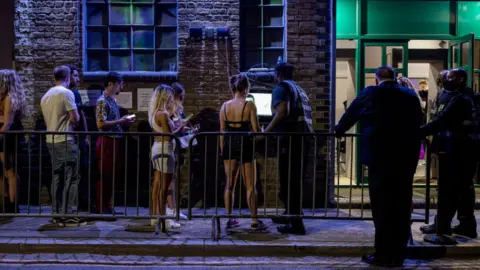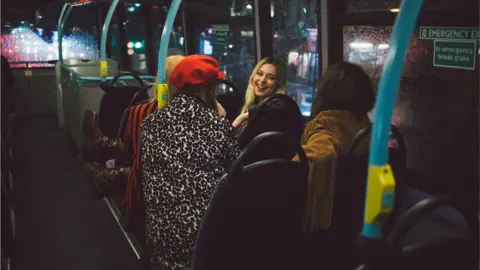Girls Night In: Clubs 'working hard' to tackle drink spiking
 Getty Images
Getty ImagesNightclubs are "working hard" to keep people safe following a rise in cases of spiking, an industry association leader has said.
Police across Wales are investigating 11 suspected cases of people being injected in September and October.
On Friday, a group called Girls Night In will lead a boycott of clubs, including those in Cardiff, calling for the issue to be taken more seriously.
Women have told the BBC they "just do not feel safe in clubs anymore".
Michael Kill, chief executive of the Night Time Industries Association (NTIA), said venues were well regulated, but his organisation was working with the government to introduce schemes to help tackle the problem.
Anna McMorrin, Labour's shadow minister for victims and youth justice and Cardiff North MP, has called for clubs to protect women from "sinister" ways used to attack them.
'Clubs aren't really changing their ways'

Jazmine Parker, 19, a student in Cardiff, was "shocked" to find out the number of people she knows who have been spiked - she is one of four in her friendship group.
The attention it has been getting on social media has been "spreading like wildfire".
"I deleted Instagram for a few days because it was so triggering," she said.
"It is a blessing and a problem - because some people are scaremongering - but it is so important to spread awareness and that counteracts it."
She said it was not just a student problem, but thinks some people who spike might be taking advantage of midweek student nights as people "have their guard down".
"It is a massive fear and it puts people off going out," she said, adding people prefer house parties as they feel safer.
Jazmine hopes the boycott will force clubs to act, adding: "Spiking has been around forever but the clubs aren't really changing their ways.
"People would pay more to be able to be safe in clubs if the provisions were in place."

'I won't even walk to the toilets in a club by myself'
Third year student Alisa - not her real name - said spiking was "100% happening more than pre-pandemic".
"It doesn't feel safe and it doesn't feel like people are there for the same reasons," she said.
"Going to a club used to be enjoyable, it felt OK to walk home by yourself and now I won't even walk to the toilets in a club by myself.
"I don't know what's changed but something has."
She said her friends took precautions, such as covering their drinks, but it did not guarantee their safety.
"With the fear of being injected - how am I meant to prevent this? How do I look after my friends? It's gotten to the point where I don't care if I can't go to a club."
Alisa believed the boycott will only be effective "if the clubs recognise it" and "blame needs to be shifted" from those spiked.
She also wanted education for those who did it and the institutions that allowed it, saying all clubs should shut in solidarity to show they took it seriously, and committed to training staff.



 Graeme Da Silva
Graeme Da Silva'Let's work together to stamp this out'
Graeme Da Silva, director of Fiction and Pryzm nightclubs in Swansea and Cardiff, said spiking was "a real fear for our guests and we take any reports extremely seriously".
"Freshers are finding their 'social' feet and learning their limits when it comes to partying and socialising, which is why there is sometimes an increase in reports of spiking at this time of year," Mr Da Silva said.
He said numbers from police did not necessarily reflect a rise, but "the good news is there is now greater awareness of the potential dangers of spiking", which has encouraged action.
He added that staff have been trained, schemes such as Ask Angela were available and anti-spiking devices such as drink covers were provided in his venues, in addition to security such as searches, metal detectors and using CCTV and bodycams.
"We would like to show our support to our student partners this Friday in raising the awareness of safety in the night-time economy. Let's work together to stamp this out," he added.
 Getty Images
Getty ImagesMr Kill said operators have been working with authorities to keep people safe "particularly women at night".
"Our industry is well regulated, and we have strict licensing objectives which encompass public safety," he added.
"With government support from the women's safety at night fund from the Home Office, we will see schemes launched over the coming weeks across the UK, which will work on disseminating initiatives around education, communication and protection.
"Our industry is working very hard to keep its customers and staff safe, and take its responsibility for duty of care extremely seriously."
Of the 11 suspected cases being investigated by police, nine were reported to South Wales Police.
They include people reporting feeling a pin-prick or experiencing soreness or a mark to the arm, police said.
Assistant Chief Constable Jenny Gilmer said the force was aware of public concern and was working with licensed premises to alert them to spiking methods.
She added: "We take all reports seriously and encourage anyone who believes they have been a victim of spiking in any form to contact us."
Two further cases were reported to Dyfed Powys Police. Gwent Police and North Wales Police said they had not received any such reports.
